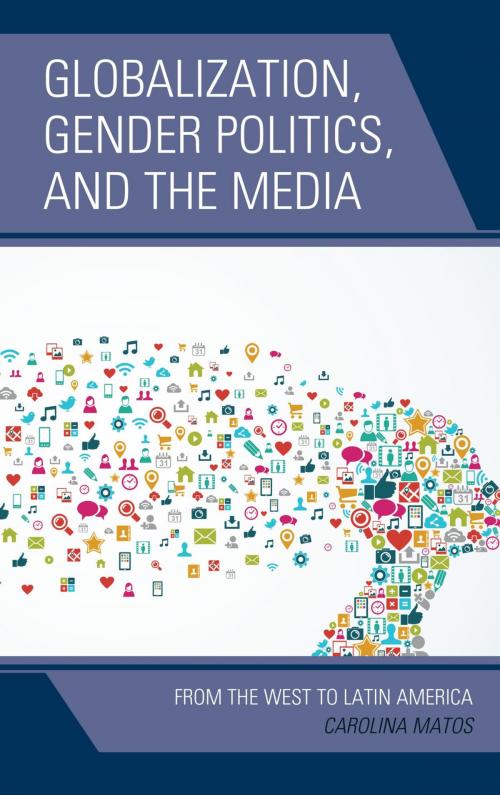Globalization, Gender Politics, and the Media
From the West to Latin America
Nonfiction, Social & Cultural Studies, Social Science, Gender Studies, Feminism & Feminist Theory| Author: | Carolina Matos, Lecturer in Sociology, City, University of London | ISBN: | 9781498512459 |
| Publisher: | Lexington Books | Publication: | November 16, 2016 |
| Imprint: | Lexington Books | Language: | English |
| Author: | Carolina Matos, Lecturer in Sociology, City, University of London |
| ISBN: | 9781498512459 |
| Publisher: | Lexington Books |
| Publication: | November 16, 2016 |
| Imprint: | Lexington Books |
| Language: | English |
From advertising to television and film, feminist media scholars have examined the changing nature of media representations form the 1990’s onwards in comparison to the 1950s in the UK and the US. Many debates focus on the current ambiguity surrounding media representations which are inserted within post-feminist texts that tend to equate female empowerment with choice, individualism and consumerism. This has occurred in a context where there have been some achievements in gender equality worldwide, with women occupying more spaces in the marketplace, business and government.
In the last decades, Latin America has been through many changes. Inequality levels have been reduced and political trends have resulted in the election of female politicians throughout the continent, corresponding with a revival of gender politics and feminist movements. At the same time, however, countries like Brazil are still home to gender discrimination and inequality, with high levels of domestic violence towards women, low levels of political representation, a culture of machismo, and the enduring predominance of stereotypical gender representations in the media.
Globalization, Gender Politics, and the Media looks at the correlation between gender inequality in society with media representations, situating the case of Brazil and Latin America within the global quest for gender justice. It emphasizes the need to equate material and economic concerns with the examination of the reproduction of values and beliefs on gender through cultural and media outlets. Questions that are asked include, how can the media better contribute to assist in gender development and nation-building? How can online platforms make a difference? What can be done within the mainstream media to advance women’s rights? What is understood by the myth of the “Brazilian woman,” and how does this connect to other notions of what the “Third World woman” is?
Using a triangulation methodology, this book includes a small selection of interviews with experts from international organizations, politicians in Brazil, and bloggers, as well as a sample of media analysis of ads, commercials, posters, campaign material, and feminist blogs to examine the challenges that gender equality faces in this country and the ways in which the media can make a difference.
From advertising to television and film, feminist media scholars have examined the changing nature of media representations form the 1990’s onwards in comparison to the 1950s in the UK and the US. Many debates focus on the current ambiguity surrounding media representations which are inserted within post-feminist texts that tend to equate female empowerment with choice, individualism and consumerism. This has occurred in a context where there have been some achievements in gender equality worldwide, with women occupying more spaces in the marketplace, business and government.
In the last decades, Latin America has been through many changes. Inequality levels have been reduced and political trends have resulted in the election of female politicians throughout the continent, corresponding with a revival of gender politics and feminist movements. At the same time, however, countries like Brazil are still home to gender discrimination and inequality, with high levels of domestic violence towards women, low levels of political representation, a culture of machismo, and the enduring predominance of stereotypical gender representations in the media.
Globalization, Gender Politics, and the Media looks at the correlation between gender inequality in society with media representations, situating the case of Brazil and Latin America within the global quest for gender justice. It emphasizes the need to equate material and economic concerns with the examination of the reproduction of values and beliefs on gender through cultural and media outlets. Questions that are asked include, how can the media better contribute to assist in gender development and nation-building? How can online platforms make a difference? What can be done within the mainstream media to advance women’s rights? What is understood by the myth of the “Brazilian woman,” and how does this connect to other notions of what the “Third World woman” is?
Using a triangulation methodology, this book includes a small selection of interviews with experts from international organizations, politicians in Brazil, and bloggers, as well as a sample of media analysis of ads, commercials, posters, campaign material, and feminist blogs to examine the challenges that gender equality faces in this country and the ways in which the media can make a difference.















